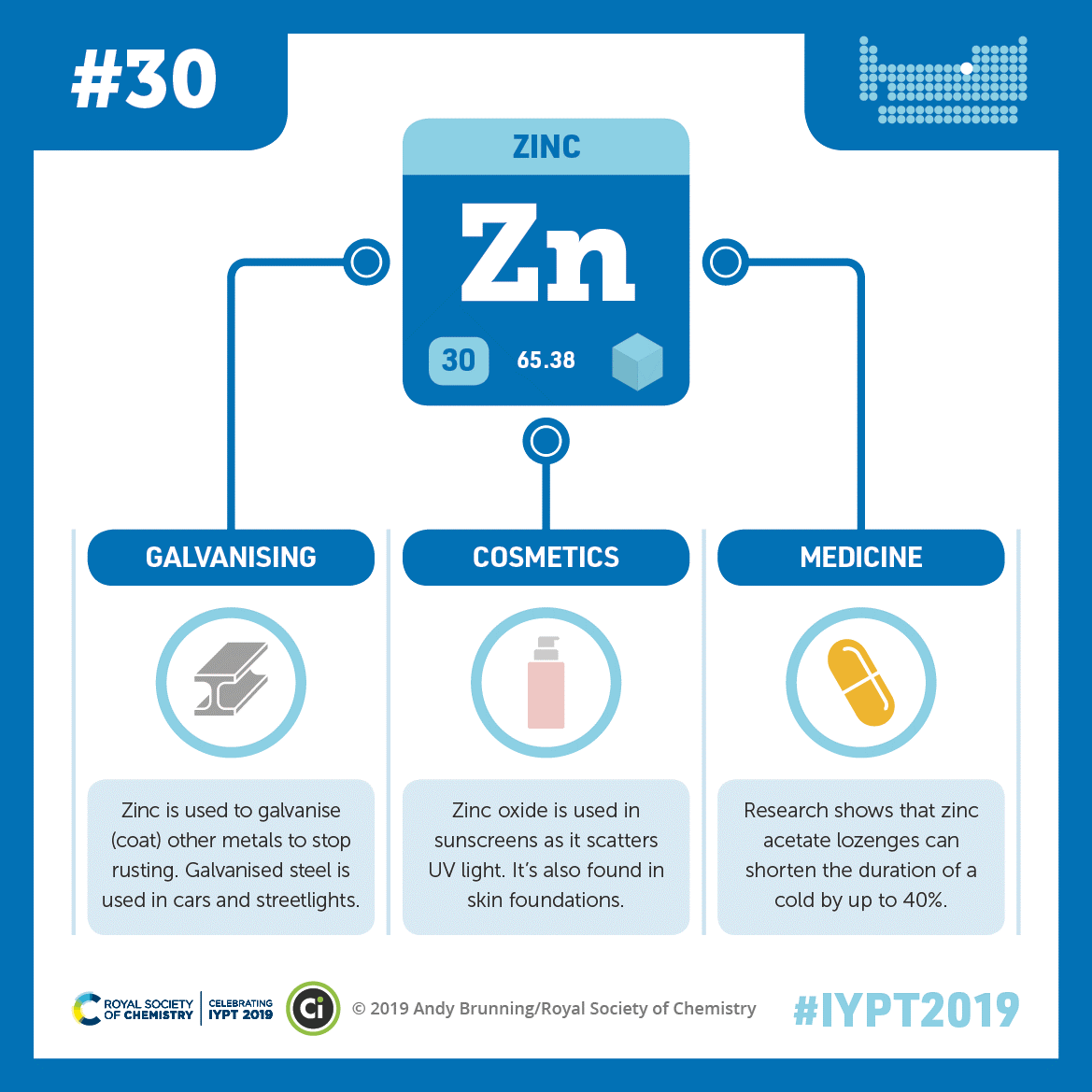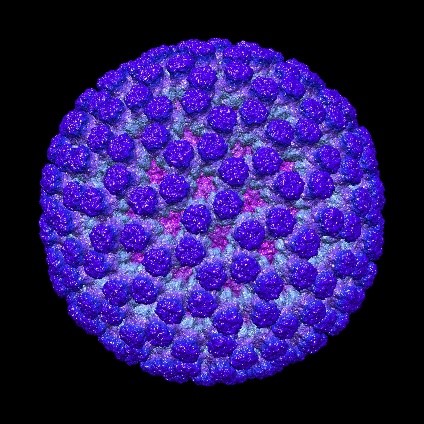Although zinc may appear last on nutrition labels, it’s the second-most abundant trace element in our bodies, behind only iron. (Trace elements are molecules our bodies need in small amounts to stay healthy). Zinc is crucial for a well-functioning immune system, wound healing, physical growth, the senses of taste and smell, and the construction of proteins and DNA. It can also partner with oxygen to form zinc oxide, a compound that scatters ultraviolet light and can act as a protective barrier over inflamed skin. Many sunscreens, burn ointments, diaper creams, and other skin treatments contain zinc oxide.
 Zinc may help shorten colds, and it’s part of a compound that can protect skin from ultraviolet light. The element is also used to coat other metals and prevent rusting. Credit: Compound Interest. CC BY-NC-ND 4.0. Click to enlarge
Zinc may help shorten colds, and it’s part of a compound that can protect skin from ultraviolet light. The element is also used to coat other metals and prevent rusting. Credit: Compound Interest. CC BY-NC-ND 4.0. Click to enlarge
Zapping Invaders Requires Zinc
 Zinc supports the immune system in combating invaders like this rotavirus, which causes severe diarrhea in infants and young children. Credit: National Resource for Automated Molecular Microscopy, The Scripps Research Institute.
Zinc supports the immune system in combating invaders like this rotavirus, which causes severe diarrhea in infants and young children. Credit: National Resource for Automated Molecular Microscopy, The Scripps Research Institute.
Zinc helps our bodies fight off dangerous invaders. Even mild cases of zinc deficiency—when the body doesn’t have enough zinc—can impair the immune system, which is the body’s defense against bacteria, viruses, and other threats to our health. Luckily, zinc deficiency is rare in the United States because the mineral is in a variety of foods we eat. The condition is more common in developing countries. Scientists are studying zinc to learn more about its effects on the immune system and its potential to prevent or treat a variety of health issues.
NIGMS-Supported Zinc Research
NIGMS funds scientists exploring a range of topics related to zinc. Some of these researchers are:- Investigating zinc’s role in neurons, particularly those involved in sound processing.
- Developing molecules that target the zinc in an enzyme that’s likely involved in the development of type 2 diabetes to inhibit the enzyme. These molecules could ultimately be developed into medicines for diabetes.
- Determining how bacteria take in zinc from their environment. Bacteria need zinc to thrive. So once scientists know how they obtain the element, they can develop new antibiotics that target these processes, depriving bacteria of zinc and thereby killing them.
Check out our other posts on elements.


Zinc very important during growing , maturation ,development , differentiation of tissues with “ hight turn over “, example skin , in malnourished children the skin lesion are impressive in presence of Zinc deficiency .
Zinc invove in Neuroendocrine secretion such pancreatic beta cells.
Zinc key player in Autoimmunity and DNA binding..
I infer its role on ageing/ antiageing at the CNS via Autoimmunity at the glia level and B and T cell circulating/ visitors.
Arnold Vera, MD. , MSc
What foods do you suggest be kept in our routine diet to ensure we get enough zinc for good health?
Also, what foods should be avoided–or eaten sparingly–which deplete zinc’s presence and/or efficacy in our daily diet?
Thanks for your interest in our blog post, Michele. The NIH Office of Dietary Supplements has more information on zinc that addresses your questions.
I worry about zinc overdosing. ACE2 the enzyme that is the receptor for SARS-CoV-2 while being a zinc dependent enzyme is also inhibited by high concentrations of zinc. ACE2 functions to metabolized angiotensin II which decreases inflammation, so we want ACE2 to be working. Additionally, intranasal zinc is neurotoxic for olfactory neurons and should never be administered by that route. Several years back ZiCam had a nasal application. Fortunately it was withdrawn.